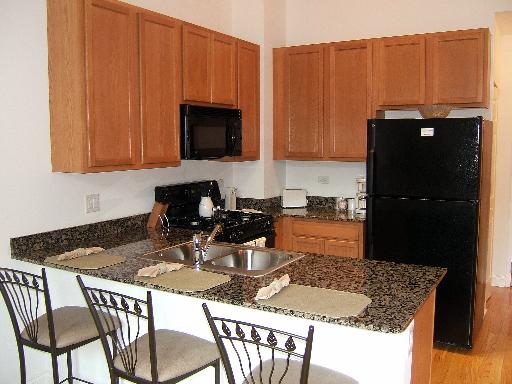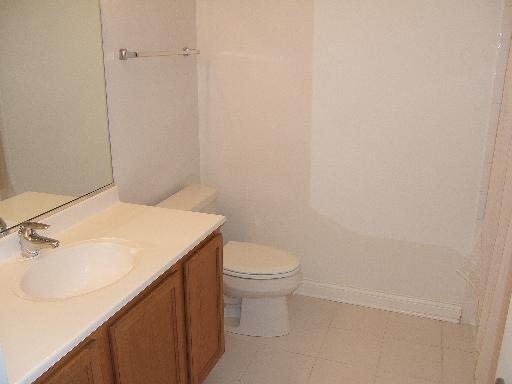Is this Metropolis condo a “steal” at $225,000?
Pat posted a comment about this 1 bedroom condo at The Metropolis at 8 W. Monroe in the Loop. I’ve talked about this building before. It is a conversion building that closed in 2006. There were and are huge numbers of flippers/investors in the building. It seems that a large percentage of the building is rented out.
The 1 bedroom condo is currently “under contract.”

Unit #801: 1 bedroom, 1 bath, about 650-675 square feet (I don’t have the exact square footage)
- Originally listed for $283,500
- Reduced to $259,000
- Reduced again to $225,000
- Listing states “huge price reduction!!! Owner needs a quick close”
- W/D in the unit
- Assessment of $326 a month
The unit finally found a buyer after 24 days on the market at the new “reduced” price (per Pat’s info.) The unit originally closed in July 2006 for $223,500.





We don’t know what the buyer is actually paying (yet). Could be the buyer bought this unit for $200,000 or less.
It’s likely, however, that the sales price will be lower than what the original owner paid in July 2006.
Is this a “steal” for the buyer?
You can also rent a one bedroom in the building for as low as $1240 a month [see Craigslist ad]. Or you can rent a two bedroom for as low as $1675.
My 2 cents, definitely not a steal.
Don’t have the patience to provide detailed calc, but here’s a quick theoretical, highly simplistic exercise in valuation….
naturally, YMMV…..someone may disagree, I don’t care as I have better things to do than engage in a flame war.
Assume an all-cash transaction for an investor. This exercise doesn’t really apply to a live-in owner as certain intangibles can’t be factored in.
current 30-yr interest rate = 4.6% (opportunity cost)
option A: Take $225k and buy a long-term US bond fund. I get $780 a month risk-free (after 2% management fee)
option b: Rent out at $1250/mo. Pay $326/mo assessments. Taxes? say $200/mo? Net $724/mo.
At this point option A is winning…
Risks of option A: increased inflation destroys value of fixed income. Rental real estate is generally better hedge against inflation.
Risks of option B: You need appreciation of the condo to make up for lower monthly income. Transaction costs. Unit must be rented out 365 days a year. Unforeseen assessments, repairs, etc. Illiquid investment. Time costs (dealing with renter, posting ads, etc). Credit risk of renter not paying rent, etc.
The final bogeyman what will be the underlying rate of appreciation of the assets? That’s unknowable….and your forecast will determine whether option A or B is better.
can go on, but have better things to do….but you get the point.
Actually, I think in a cash transaction, there are two things I would change about your calculations. For one, anyone who put $225,000 into a long term bond is, frankly, insane. A more realistic return on a 30 year investiment would be 9-10%, in the stock market.
Another thing you need to change is appreciation on the unit. IF this buyer bought the unit at about what it is “worth,” then over 30 years, on average, real estate keeps up with inflation. So expect a yearly return of about 4%.
So, Option A: 9% of 225K = $20,250.
Option B: 4% of 225K = $9000, plus the net you describe of $724 (which I think is awfully rough, but approximate) X 12 mos = $8688. $8688 + 9000 = $17,688.
Option B still loses. Of course, this would be for a long term investment, IF the unit is really priced “accurately.” If is priced too high, then the owner can’t expect the unit to appreciate 4% a year. If priced too low, or if invested for a short term quick kill AND we are presently in a trough, the owner might make more than in the stock market. Really, *everything* depends on whether the unit is priced appropriately… and no one knows that right now. Unfortunately, only hindsight will be 20/20.
Kenworthy: It all depends on any kind of future appreciation. Right now, all we know is that the price of this condo declined in the last 18 months (based on the 2006 sales price and what it will likely sell for here- which we don’t know yet.)
But you’re right- who knows what will happen with appreciation in the next year? (let alone 10 or more.)
In the 1980s, after the last great condo boom, condo prices stayed flat in Chicago for years.
Nothing is certain, of course, but real estate over the VERY long term tends to appreciate at about 4%. Stocks, over the VERY long term, tend to appreciate at about 10%.
So anyone trying to invest in the short-term in either real estate OR the stock market, is indeed a gambler. Or maybe I should say, some are gamblers (the amateurs) and some are good poker players (the true professionals)–that is, the poker players still have to contend with chance, but if they are skilled, they can make money. Risky money, but what money isn’t?
So I guess my point is, anyone interested in investing in the long term, in either stocks or RE, is fairly safe. But by long term, I mean 20+ years. This means that people like me, who are just looking for a place to live in for the next 10-20 years, aren’t taking THAT much of a risk… though yes, they are still taking a risk, and the shorter a time they plan to hold, the bigger the risk they face. This is mainly because in any slice of time, we don’t know where we are in the RE cycle.
I don’t have anything constructive to say about whether it is a steal or not, just a few useless comments on the comments 🙂
The rough estimate of the net rent didn’t include things like insurance, repairs and maintenance, the depreciation deduction the IRS allows on rental property, or even the lost rent when it takes a month or two or five to get a new tenant after the prior one leaves. Perhaps not so important when doing back-of-the-envelope estimates.
Oh, and I understand people putting a lot of money into government bonds instead of stocks – perceived safety. But bond funds that invest only in US government bonds seem a bit obsolete these days since the Treasury has cut out the middleman and now allows you to buy direct from them at a website appropriately named Treasury Direct (dot gov). Link up your bank account like you do Paypal and they take money out when you buy and put it back in when your bond matures. You can even tell them to automatically roll the bonds over when they mature. Commission-free too, which makes those 2% management fees ridiculous in comparison.
Well, that’s all. Feel free to continue discussing whether the price counts as a “steal” or not, though I suspect it’s not.
Sold $221,650
Thanks for the update City Agent. That’s a big loss for that seller.